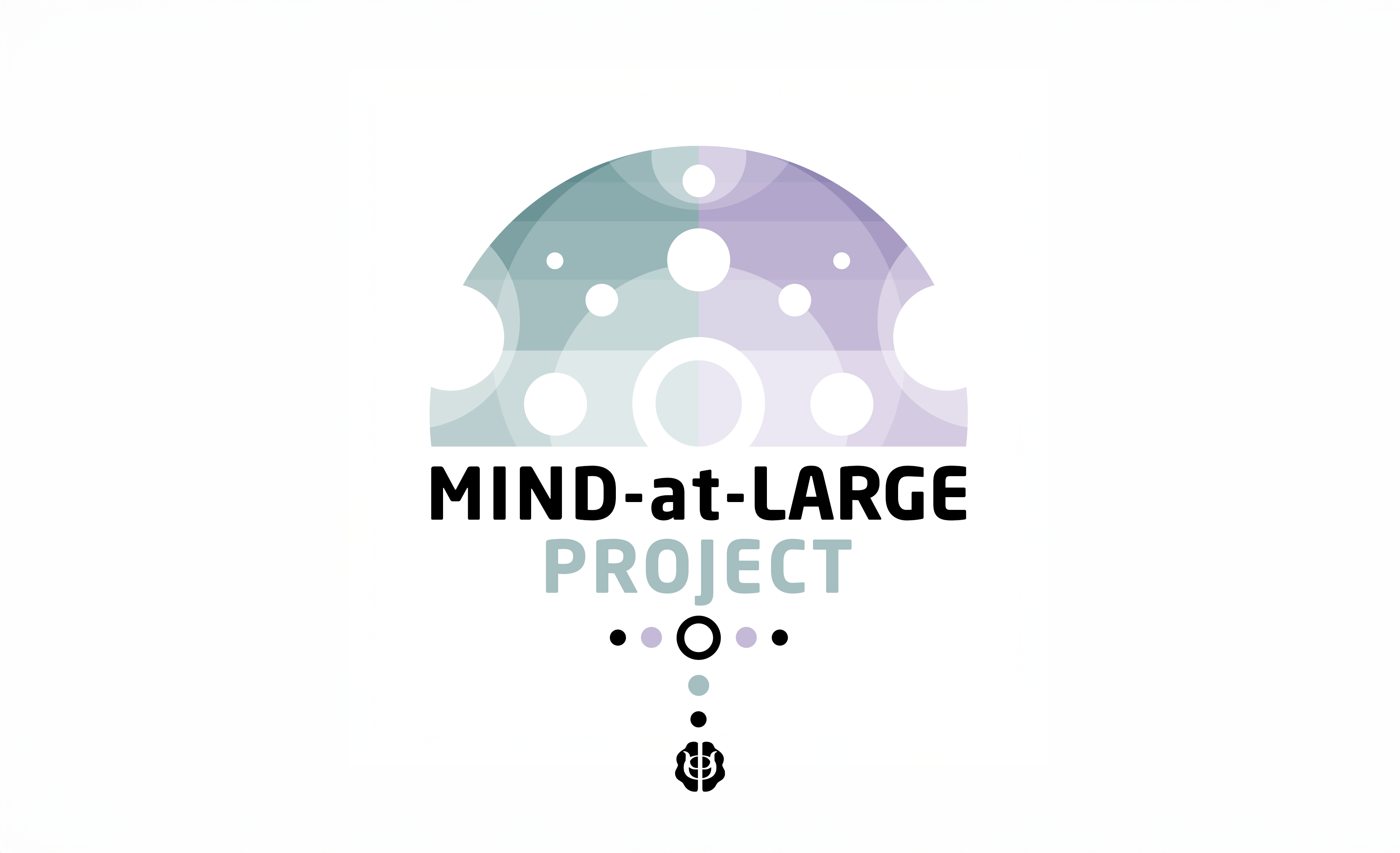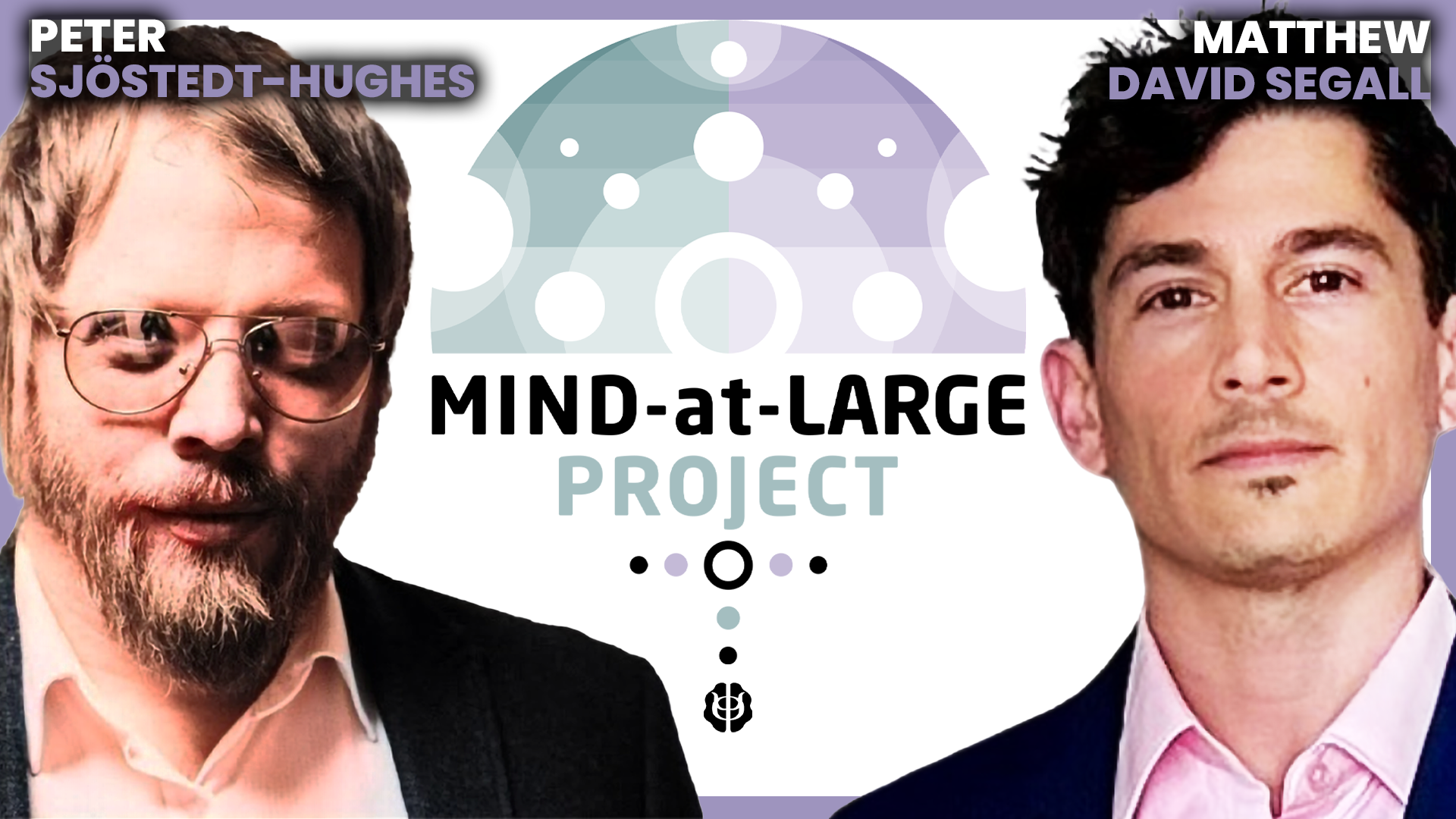The Mind-at-Large Project: A New Paradigm in Consciousness Research

Welcome to a deeper dive into the fascinating world of consciousness and its role in reality. In this blog post, we'll be expanding on the topics discussed in our latest podcast episode, Introducing the Mind-at-Large Project: A New Paradigm in Consciousness Research | Mind-Body Solution. The Mind-at-Large Project is a groundbreaking, multidisciplinary initiative aimed at exploring consciousness across various scales, from quantum systems to the entire cosmos. We'll delve into the project's core ideas, its philosophical underpinnings, and its potential to revolutionize our understanding of existence itself. Get ready for a journey that challenges conventional wisdom and opens doors to new possibilities.
Bridging Science, Philosophy, and Beyond: Setting the Stage for Exploration
The Mind-at-Large Project stands at the intersection of science, philosophy, and beyond, aiming to create a space where these traditionally separate fields can converge. Current scientific paradigms often struggle to account for the subjective experience of consciousness. This project seeks to bridge that gap by incorporating philosophical insights and exploring perspectives that go beyond the strictly materialist view. This interdisciplinary approach allows for a more holistic and comprehensive understanding of consciousness, acknowledging the value of both empirical data and subjective experience.
Defining 'Mind-at-Large': Context from Bergson, James, and Whitehead
The term "Mind-at-Large" itself draws inspiration from thinkers like Henri Bergson, William James, and Alfred North Whitehead. Bergson’s concept of “élan vital,” a vital force driving evolution, suggests a universe imbued with creative energy. James explored the idea of consciousness extending beyond the individual brain, a concept resonant with psychedelic experiences and mystical states. Whitehead's process philosophy emphasizes the interconnectedness of all things, viewing the universe as a dynamic process of becoming. These thinkers provide a foundation for understanding Mind-at-Large as a broader, more encompassing field of consciousness that permeates reality.
The Role of Philosophy: Expanding Mind Beyond Materialism
Philosophy plays a crucial role in expanding our understanding of consciousness beyond the limitations of strict materialism. Materialism, the dominant worldview in modern science, posits that everything is ultimately reducible to matter and its interactions. However, this perspective struggles to explain subjective experience, qualia (the "what it's like" of experience), and the sense of self. Philosophy offers alternative perspectives, such as panpsychism, which suggests that consciousness, or proto-consciousness, is a fundamental property of all matter, and idealism, which posits that reality is fundamentally mental or spiritual in nature. By engaging with these philosophical ideas, the Mind-at-Large Project aims to develop a more comprehensive and nuanced understanding of consciousness.
Process Philosophy: Cosmos as a Living Mind
Process philosophy, particularly the work of Alfred North Whitehead, offers a compelling framework for understanding the cosmos as a living mind. Whitehead argued that reality is not composed of static objects but rather of dynamic processes, or "occasions of experience." These occasions are interconnected and influence each other, creating a constantly evolving and interconnected universe. This perspective suggests that the cosmos itself can be understood as a vast, complex, and evolving consciousness, with each individual entity contributing to the overall experience. This view contrasts sharply with the traditional scientific view of a mechanistic and inert universe, offering a more vibrant and participatory understanding of reality.
Psychedelics, Panpsychism, and the Renewal of Consciousness Studies
The resurgence of interest in psychedelics has played a significant role in the renewal of consciousness studies and the exploration of panpsychism. Psychedelic experiences often involve altered states of consciousness, profound mystical insights, and a sense of interconnectedness with the universe. These experiences challenge the conventional view of consciousness as solely a product of the brain and lend support to the idea that consciousness may be more widespread than previously thought. By providing access to altered states of consciousness and facilitating profound insights into the nature of reality, psychedelics offer a valuable tool for exploring the mysteries of consciousness and supporting the investigation of panpsychism.
The Crisis of Materialism: Why Science Needs a Broader Ontology
The limitations of materialism have led to a crisis in our understanding of consciousness and the nature of reality. The hard problem of consciousness, the difficulty of explaining how subjective experience arises from objective matter, highlights the inadequacy of a purely materialist worldview. Phenomena such as near-death experiences, out-of-body experiences, and psi phenomena (e.g., telepathy, precognition) further challenge the materialist paradigm. To overcome this crisis, science needs to embrace a broader ontology, one that acknowledges the role of consciousness and incorporates perspectives beyond the strictly material. This includes exploring alternative ontologies such as panpsychism, idealism, and process philosophy.
Reconciling Science and Spirituality Without Dogma
The Mind-at-Large Project seeks to reconcile science and spirituality without resorting to dogma or religious dogma. It does so by focusing on shared experiences and insights across different traditions. Mystical experiences, for example, often involve a sense of unity, interconnectedness, and transcendence that resonates with both spiritual teachings and certain scientific concepts, such as quantum entanglement and the holographic universe. By exploring these commonalities and fostering open dialogue, the project aims to bridge the gap between science and spirituality, creating a more holistic and integrated understanding of reality.
Whitehead's Influence: From Process to Participation
Alfred North Whitehead's process philosophy has been profoundly influential in shaping the Mind-at-Large Project. His emphasis on process, interconnectedness, and the inherent value of all experience provides a framework for understanding the universe as a participatory system. According to Whitehead, every entity, from the smallest particle to the largest galaxy, is an "occasion of experience" that actively contributes to the ongoing process of becoming. This perspective challenges the traditional view of a passive and inert universe, suggesting that we are all active participants in the unfolding drama of existence. This perspective can lead to a greater sense of responsibility and interconnectedness with the world around us.
Consciousness as Cosmos: The Participatory Universe
The idea of "Consciousness as Cosmos" suggests that consciousness is not merely a product of the brain but is, instead, a fundamental aspect of the universe itself. This perspective aligns with panpsychism and process philosophy, which both emphasize the inherent consciousness or proto-consciousness of all things. If consciousness is indeed a fundamental property of the universe, then the cosmos itself can be seen as a vast, interconnected, and evolving consciousness, with each individual entity contributing to the overall experience. This perspective transforms our understanding of our place in the universe, suggesting that we are not merely passive observers but active participants in the cosmic dance of consciousness.
Bergson's "Élan Vital" and the Evolution of Experience
Henri Bergson's concept of "élan vital," or vital force, offers a compelling perspective on the evolution of experience. Bergson argued that evolution is not simply a random process of natural selection but is driven by a creative force that seeks to enhance and diversify life. This vital force is not a blind mechanism but a kind of striving, an impulse towards greater complexity, awareness, and freedom. Bergson's concept of élan vital resonates with the Mind-at-Large Project's emphasis on the inherent creativity and dynamism of the universe. It suggests that consciousness is not a static entity but a constantly evolving and expanding phenomenon, driven by the inherent creative force of life itself.
Nietzsche, Bergson, and Psychedelic Metaphysics
The philosophies of Friedrich Nietzsche and Henri Bergson, combined with the experiences facilitated by psychedelics, offer a powerful and transformative metaphysical perspective. Nietzsche's emphasis on the will to power, the eternal recurrence, and the affirmation of life, combined with Bergson's concept of élan vital and the direct experiences of interconnectedness and transcendence often induced by psychedelics, can lead to a radical shift in our understanding of reality. This perspective suggests that the universe is not a fixed and deterministic system but a dynamic and creative process of becoming, driven by the will to power and the élan vital. By embracing this perspective, we can overcome nihilism and embrace the inherent value and potential of existence.
Cosmotheology: The Universe as an Ongoing Creation
Cosmotheology offers a compelling perspective on the universe as an ongoing creation. This perspective suggests that the universe is not a static and finished product but is, instead, a dynamic and creative process of becoming. Just as a work of art is constantly evolving and being shaped by the artist, so too is the universe constantly evolving and being shaped by the creative force of consciousness itself. This perspective aligns with process philosophy and panpsychism, which both emphasize the inherent creativity and dynamism of the universe. By embracing this perspective, we can see ourselves as active participants in the ongoing creation of the cosmos, contributing to the unfolding drama of existence.
The Ethics of Expanding Consciousness: Individual and Cosmic Implications
The expansion of consciousness, whether through philosophical inquiry, psychedelic experiences, or other means, raises important ethical questions. As our understanding of consciousness deepens and our awareness of interconnectedness grows, our sense of responsibility for ourselves, others, and the planet increases. Expanding consciousness can lead to greater empathy, compassion, and a desire to create a more just and sustainable world. However, it can also lead to challenges, such as the potential for misuse of power, the difficulty of navigating altered states of consciousness, and the need to integrate profound experiences into everyday life. Therefore, it is essential to approach the expansion of consciousness with intention, mindfulness, and a commitment to ethical principles.
Philosophy's Function Today: Meaning in an Age of Mechanism
In an age dominated by scientific materialism and technological advancement, philosophy plays a crucial role in providing meaning, purpose, and ethical guidance. While science can tell us how the world works, it cannot tell us why we are here or how we should live. Philosophy offers a framework for exploring these questions, providing us with tools for critical thinking, ethical reasoning, and the search for meaning. By engaging with philosophical ideas, we can develop a more nuanced and comprehensive understanding of ourselves, our place in the world, and our responsibilities to others. In an age of mechanism, philosophy reminds us of the importance of human values, ethical principles, and the search for meaning.
The Role of Psychedelics in Re-enchanting the World
Psychedelics have the potential to re-enchant the world by fostering a sense of awe, wonder, and interconnectedness. In a modern world often characterized by disenchantment, alienation, and a sense of meaninglessness, psychedelics can offer profound experiences of unity, transcendence, and connection to something larger than oneself. These experiences can challenge our conventional perceptions of reality, break down limiting beliefs, and inspire a sense of reverence for the natural world. By re-enchanting the world, psychedelics can help us to reconnect with our deepest values, rediscover our sense of purpose, and cultivate a more meaningful and fulfilling life.
Toward an Integrative Science of Mind-at-Large
The Mind-at-Large Project seeks to foster an integrative science of mind that incorporates insights from diverse fields, including neuroscience, philosophy, psychology, anthropology, and contemplative traditions. This integrative approach recognizes that consciousness is a complex and multifaceted phenomenon that cannot be fully understood from a single perspective. By bringing together different disciplines and perspectives, the project aims to develop a more comprehensive and nuanced understanding of consciousness, exploring its origins, its functions, and its potential for transformation.
Panpsychism vs. Idealism: Mapping the Metaphysical Terrain
Panpsychism and idealism are two prominent metaphysical perspectives that challenge the dominant materialist worldview. Panpsychism posits that consciousness, or proto-consciousness, is a fundamental property of all matter, while idealism posits that reality is fundamentally mental or spiritual in nature. While both perspectives offer compelling alternatives to materialism, they differ in their specific claims about the nature of reality. Panpsychism suggests that even the smallest particle has some degree of consciousness, while idealism suggests that everything is ultimately a manifestation of mind or consciousness. Exploring the differences and similarities between these perspectives can help us to map the metaphysical terrain and develop a more nuanced understanding of consciousness and its role in reality.
Whitehead’s Process Metaphysics & Ecology of Mind
Whitehead's process metaphysics provides a robust foundation for understanding the ecology of mind. His emphasis on interconnectedness, dynamic processes, and the inherent value of all experience resonates deeply with ecological principles. According to Whitehead, every entity is an "occasion of experience" that is interconnected with and influenced by all other entities. This perspective suggests that the mind is not confined to the brain but is, instead, distributed throughout the entire system, including the body, the environment, and the social context. This "ecology of mind" emphasizes the importance of understanding consciousness as an emergent property of complex systems, rather than as a localized phenomenon within the brain.
Nietzsche’s Eternal Return & Mind as Becoming
Nietzsche's concept of the eternal return offers a powerful and transformative perspective on the nature of existence and the role of consciousness. The eternal return asks us to imagine that everything we have ever experienced, both good and bad, will recur infinitely. This thought experiment challenges us to affirm our lives fully and to embrace the inherent value of every moment. Combined with the concept of "mind as becoming," which emphasizes the dynamic and ever-changing nature of consciousness, the eternal return encourages us to live each moment with intention, awareness, and a commitment to self-creation. By embracing this perspective, we can overcome nihilism and create a life of meaning, purpose, and joy.
The Future of Consciousness Studies: Interdisciplinary Frontiers
The future of consciousness studies lies in interdisciplinary collaboration and the exploration of new frontiers. As we have seen, consciousness is a complex and multifaceted phenomenon that cannot be fully understood from a single perspective. Therefore, it is essential to foster collaboration between different disciplines, including neuroscience, philosophy, psychology, anthropology, and contemplative traditions. Furthermore, the future of consciousness studies will involve exploring new frontiers, such as the role of quantum mechanics in consciousness, the potential for artificial consciousness, and the ethical implications of expanding consciousness. By embracing interdisciplinary collaboration and exploring new frontiers, we can unlock the mysteries of consciousness and transform our understanding of ourselves and the universe.
Mind-at-Large Conferences: Mission, Vision & Collaboration
The Mind-at-Large Project organizes conferences and workshops to foster collaboration, share research, and explore the frontiers of consciousness studies. These events bring together leading scientists, philosophers, artists, and practitioners from diverse fields to engage in open dialogue, share insights, and develop new perspectives on consciousness. The mission of the Mind-at-Large conferences is to promote interdisciplinary collaboration, expand the paradigm of consciousness research, and explore the ethical and social implications of expanding consciousness. The vision is to create a more holistic and integrated understanding of consciousness that can contribute to a more just, sustainable, and meaningful world.
Conclusion: Consciousness, Cosmos, and Human Meaning
The Mind-at-Large Project represents a bold and ambitious attempt to expand our understanding of consciousness and its role in reality. By bridging science, philosophy, and beyond the project aims to create a more holistic and integrated understanding of consciousness, exploring its presence across scales, from quantum systems to the cosmos itself. As we have seen, the implications of this research are profound, potentially transforming our understanding of ourselves, our place in the universe, and the very nature of existence. We encourage you to listen to our recent podcast episode, Introducing the Mind-at-Large Project: A New Paradigm in Consciousness Research | Mind-Body Solution, for a more detailed discussion of these ideas and to join us on this exciting journey of exploration.
The Mind-at-Large Project in a Nutshell
The Mind-at-Large Project is a three-year conference series, with associated film and other media, that investigates consciousness and its role in reality. The project seeks to challenge the common yet unnecessarily-restrictive worldview that posits that brains alone are required for consciousness. We seek to expand to a broader ‘mind-at-large’ set of theories by exploring mind’s presence across various scales, from quantum physics to ecosystems to the cosmos as a whole. This is a multidisciplinary project though anchored in Philosophy, looking at ideas including panpsychism, pantheism, 4E cognition, questions of AI and plant sentience, animism, perspectivism, idealism—as well as certain associated extraordinary phenomenologies such as those found in psychedelic states or paranormal phenomena. The first Mind at Large conference will take place at University of Exeter, April 15-17, 2026. Prepare for the new paradigm.








